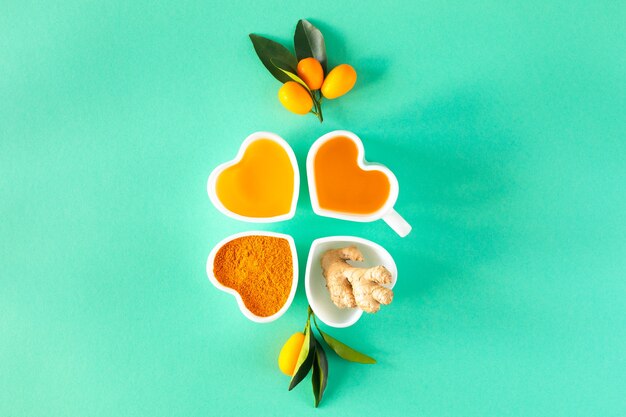
### What is Curcumin?
Curcumin is a component of turmeric, a well-known Indian spice that’s known for its bright yellow color. Curcumin is a polyphenol, which not only acts as a dietary supplement but is also used as a food colorant. The turmeric we use comes from the Curcuma longa plant, which is related to ginger.
### Historical Uses of Curcumin
Since 1900 BCE, curcumin and turmeric have been used in Ayurveda, a traditional Indian system of medicine. Found in South Asia and the Himalayas, curcumin was used both externally and internally to treat various conditions due to its anti-inflammatory and antioxidant properties.
### Benefits of Curcumin
**Enhanced Brain Function:**
Curcumin increases levels of Brain-Derived Neurotrophic Factor (BDNF), a hormone that boosts brain function and reduces the risk of brain diseases. It can help delay or even reverse the progression of brain disorders.
**Heart Health:**
Curcumin can improve heart health by enhancing the function of the endothelium, the lining of blood vessels. This improvement helps regulate blood pressure and clotting, significantly reducing the risk of heart disease through its antioxidant and anti-inflammatory effects.
**Cancer Prevention:**
Curcumin aids in preventing and slowing the growth of cancer cells. It has been shown to reduce cancer metastasis and angiogenesis. This is particularly effective in cancers of the digestive system like colon cancer.
**Alzheimer’s Disease:**
Curcumin can cross the blood-brain barrier and helps clear amyloid plaques, which are associated with Alzheimer’s disease, thereby treating this form of neurodegeneration.
**Arthritis Relief:**
As a strong anti-inflammatory agent, curcumin alleviates joint inflammations characteristic of arthritis, providing significant relief.
**Depression Treatment:**
Curcumin has been found to be as effective as some antidepressant medications. It boosts levels of BDNF and neurotransmitters like dopamine and serotonin, which are crucial for improving mood and cognitive function.
**Anti-Aging Properties:**
Curcumin’s antioxidant and anti-inflammatory properties help fight the effects of aging by reducing oxidative stress and inflammation.
**Diabetes Management:**
Curcumin can lower blood sugar levels and reverse insulin resistance. It’s significantly more potent than some medications used for Type 2 diabetes and aids in improving insulin sensitivity.
**Digestive Health:**
Curcumin helps treat inflammatory bowel diseases like Crohn’s disease and ulcerative colitis, providing a natural alternative to traditional medications without the side effects.
**Pain Management:**
Curcumin acts as a natural pain reliever by activating the opioid system and can be used topically to treat severe burns and chronic pain.
**Allergy Defense:**
Curcumin reduces the release of histamines, helping to manage symptoms of allergies and asthma.
**Antibacterial and Antiviral Benefits:**
Research indicates curcumin has properties that combat various bacterial and viral infections.
**Fatigue Reduction:**
Curcumin supplements can reduce fatigue, especially in older adults or those with chronic conditions.
**Parkinson’s Disease:**
Curcumin is effective in treating Parkinson’s disease by preventing the clumping of proteins.
**Cystic Fibrosis:**
Curcumin helps manage cystic fibrosis by preventing abnormal protein folding.
**Cardiovascular Wellness:**
Curcumin protects cardiac tissue, reduces the risk of arteriosclerosis, improves blood flow, and helps maintain endothelial health.
**Cholesterol and Triglycerides Management:**
Curcumin lowers levels of total cholesterol and triglycerides, contributing to better cardiovascular health.
**Glucose Metabolism:**
Curcumin helps regulate blood sugar levels and enhances insulin sensitivity, making it beneficial for managing diabetes.
**Obesity and Inflammation:**
Curcumin reduces inflammation in fat cells and activates AMPK, aiding in weight management and metabolic health.
**Skeletal Muscle Protection:**
Curcumin protects against oxidative damage and supports muscle recovery and glucose metabolism.
**Anti-Inflammatory Effects:**
Curcumin inhibits multiple inflammatory signals, making it effective against arthritis and other inflammatory conditions.
**Antiviral Effects:**
Studies show that curcumin suppresses the replication of certain viruses.
**Hormone Regulation:**
Curcumin helps maintain testosterone levels and inhibits enzymes that convert testosterone into other hormones.
**Cancer Protection:**
Curcumin prevents DNA damage from oxidation and protects against various types of cancer by inhibiting cell growth and inducing apoptosis.
### Side Effects and Considerations
Curcumin is generally safe when used in cooking, but high doses can cause stomach issues, gallbladder problems, and increase the risk of kidney stones. Pregnant women should consult their doctors before using it. Common side effects may include nausea, vomiting, diarrhea, and stomach pain. The risk of these side effects can depend on the dosage and other medications being taken. Always consult a doctor before starting any new supplement.
### Conclusion
Curcumin offers numerous health benefits, from reducing inflammation and enhancing brain function to managing heart disease and diabetes. It’s a powerful antioxidant and anti-inflammatory agent that can be a valuable addition to a healthy lifestyle.